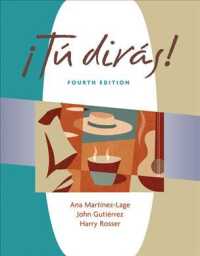- ホーム
- > 洋書
- > 英文書
- > Politics / International Relations
Full Description
President George H. W. Bush assumed office at a critical juncture, as the Cold War came to an end and the world shifted to a new era of international relations. In The Gulf War, Spencer Bakich argues that Bush fashioned a grand strategy to bring about a New World Order designed to transform international politics by focusing on great power cooperation through the United Nations. The Persian Gulf War became the chance for Bush to put his strategy into action. This latest volume in the Landmark Presidential Decision series offers a fresh and concise look at President Bush's strategic decision making and his choice to wage war against Iraq.Bakich, an expert in wartime strategy, traces the ideas and actions of Bush's new world order strategy between 1989 and 1991, which had a profound impact on the diplomacy of Desert Shield and the warfighting of Desert Storm. Bush's strategic beliefs contained core elements of Wilsonian internationalism—specifically its goals of promoting democracy, conducting multilateral diplomacy through international institutions, and transforming the United Nations into the collective security institution that its founders envisioned. His "New World Order" was not mere political sloganeering intended to bolster support for the Persian Gulf War among a skeptical American public. Rather, Bush intended the Gulf War to exercise and firmly establish the UN's collective security function in the post-Cold War era.
In this bold new interpretation of George H. W. Bush's foreign policy, Bakich challenges conventional wisdom, arguing that Bush's New World Order was carefully defined and had a comprehensive logic. He shows how Bush's strategic beliefs oriented American statecraft in peace and war. Bush's grand strategy was remarkably coherent, powerfully affecting how his administration decided to go to war to evict Iraq from Kuwait, how it waged war in the Persian Gulf, and ultimately the reasons why the fighting was terminated before the coalition's war aims were completely achieved. In the end, the Gulf War's outcome exposed faulty assumptions about the international system that underpinned the strategy, weakening the president's fidelity to his own approach. Ultimately, the Gulf War did usher in a New World Order, but not the one Bush had envisioned.
Contents
Foreword by Meena Bose
Acknowledgments
Introduction
1. George Bush: President and Strategist
2. The New World Order Grand Strategy, 1989-1990
3. Operation Desert Shield and the Decision for War
4. Operation Desert Storm
5. War and Statecraft in the post-Cold War Era
Notes
Bibliographic Essay
Index






